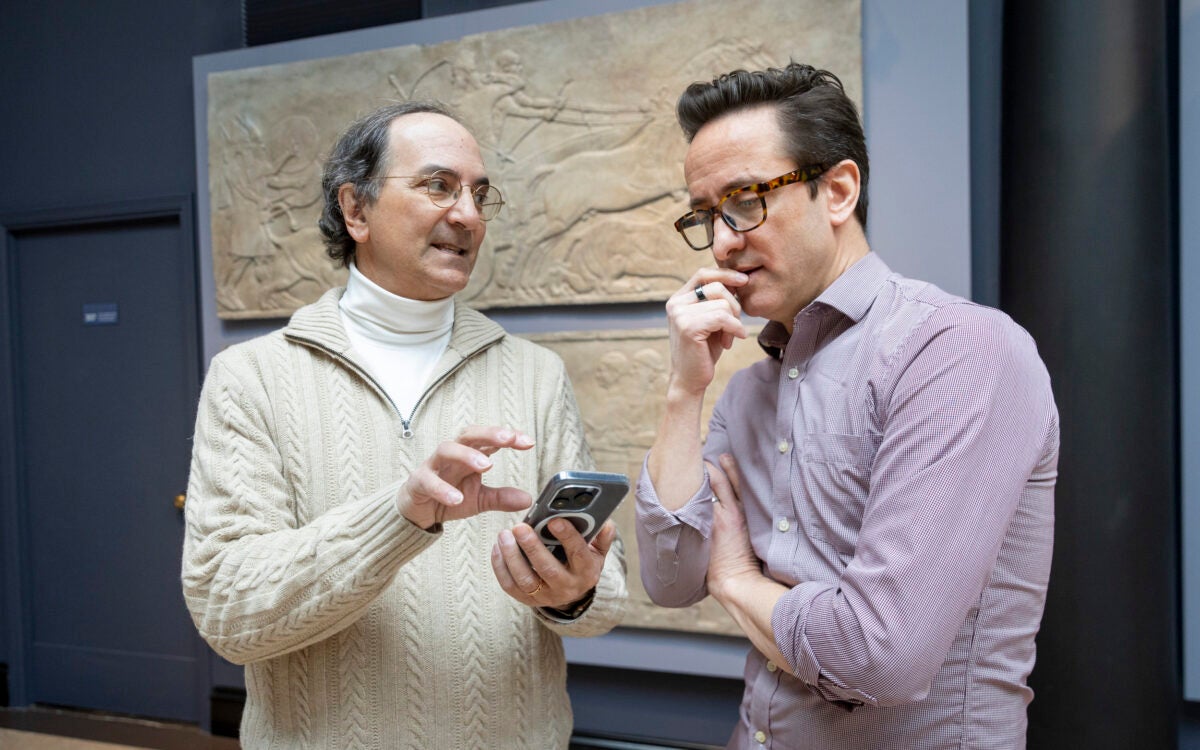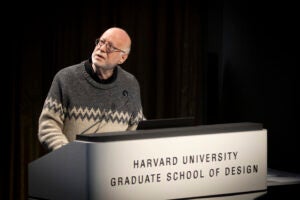Heaney ‘catches the heart off guard’
Nobel laureate moves, amuses Sanders Theatre audience
Over the years, readings by poet Seamus Heaney have been so wildly popular that his fans are called “Heaneyboppers.”
A reading this week at Sanders Theatre, sponsored by Harvard’s Department of English and American Literature and Language, was no exception. The event’s free tickets were gone weeks ago, within hours, and on Tuesday (Sept. 30) a crowd of about 1,000 packed into the theater’s stately tiered seats.
It was Heaney’s first reading at Harvard in four years, and he called the event “an overwhelming moment to be here, one of the greatest moments of my life.”
Introducing him was poetry scholar Helen Vendler, Harvard’s A. Kingsley Porter University Professor. She called the Northern Ireland native “a poet of the century, and the new century, but also a poet of Harvard.”
As much as he is a part of the world, said Vendler, Heaney has been for almost three decades a part of Harvard, too. (Starting in 1984, he has been, variously, Harvard’s Bolyston Professor of Rhetoric and Oratory, and the Ralph Waldo Emerson Poet-in-Residence.)
Two of Heaney’s poems, she said, were “gifts” to Harvard. “Alphabets” was composed for the 1984 Phi Beta Kappa Exercises. It’s a child’s-eye view of language, from the first letters in chalk, through the Latin and Gaelic of boyhood, to the sense of wordless wonder that survives adulthood, “As from his small window/The astronaut sees all he has sprung from.”
“Villanelle for an Anniversary” was delivered in Tercentenary Theatre in 1986, the year that marked the 350th anniversary of Harvard’s founding. The poem, Heaney explained later, was an attempt to answer the question: “How do people listen to a poem over a loudspeaker?”
The answer, he said, was the villanelle, a poetic form that employs repeated rhyming refrains. The strictly formatted 19-line poem was the first villanelle he had ever written, said Heaney, “and should be the last.”
Vendler liked the poem for its evocation of Harvard Yard, and what its words said about the receptive and absorbing beauty of a university. “The books stood open,” reads the poem’s refrain, “and the gates unbarred.”
Between poems, Heaney unbarred some personal gates, including oblique references to his Irish boyhood, his “fiddling” of late with Book VI of “The Aeneid,” and his “getting started again” after being stopped by a stroke (in 2005). “Very lovely,” said Heaney, “to get started again.”
The poet’s gratitude at survival intertwines with Virgil’s old epic. Musing on the hero Aeneid’s journey to the underworld, where he sees a vision of Rome’s future, Heaney said, “I end up above ground, with a grandchild. That’s my vision of the future.”
His as yet unpublished reworking of Virgil’s tale in an Irish landscape — complete with Lethe-like Irish fishing rivers — is dedicated to his grandchildren.
He read “Canopy,” another Harvard poem, which recalls a 1994 art installation in Harvard Yard that included rigging the trees overhead with speakers and recorded sounds. For Heaney, that called to mind “a congregation of leaves, or a wood that talked in its sleep.”
For 24 years, Heaney said, he has read poems all over campus, in halls from Emerson and Agassiz to Memorial — the stuff of fond memory. “This,” said Heaney, “is the acme of it.”
One reason, he said, is that “it’s always worth coming back to hear Helen’s introductions” — offering as they do “complete renovation for oneself.” The 1995 Nobel laureate called Vendler “one of the great teachers of the 20th century, one of the great guardians of poetry, one of the great hearers and helpers of the work.”
Heaney is a mellifluous reader of his own work, equipped as he is with a resonant Irish voice and a gift for pauses that surrender a poem’s meaning in a way that reading on the page cannot.
It was apt that the first piece he read was “a poem about hearing things,” noted Heaney. “The Rain Stick” memorializes his amazed discovery of a traditional Chilean instrument, a hollowed tube of cactus filled with beads or beans that cascade rain-like against inner pins when the tube is upended.
“… And now here comes/A sprinkle of drops out of the freshened leaves,/Then subtle little wets off grass and daisies;/Then glitter-drizzle, almost-breaths of air.”
To hear such a sound, “You are like a rich man entering heaven,” the poem reads, “Through the ear of a raindrop.”
Heaney’s careful language — grounded and surprising — was a joy to hear from the man himself.
In “Settings,” he read of staring into a clear harbor seabed, where there was “Perfected vision: cockle minarets/ Consigned down there with green-slicked bottle glass,/Shell-debris and a reddened bud of sandstone.”
Apt again, Heaney ended his Harvard reading with “Postscript.” An autumn car ride along the coast of western Ireland evokes the act of reading poetry — transportation by words alone to a magical world just beneath the material one. “You are neither here nor there,” the poem says at the end.
Share this article
A hurry through which known and strange things pass
As big soft buffetings come at the car sideways
And catch the heart off guard and blow it open.




